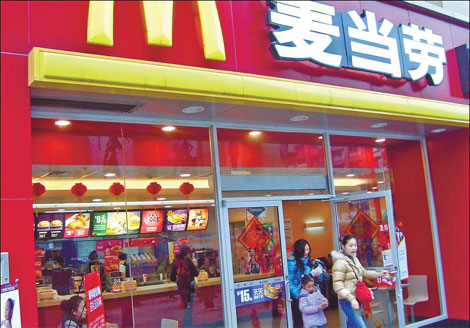FDI growth to remain robust over coming year
|
|
|
A McDonald's outlet in Yichang, Hubei province. The world's largest fast food chain says it will open 1,000 restaurants in China during the next three years. [China Daily] |
China's foreign direct investment (FDI) will continue to experience robust growth this year, following an increase of 23 percent in January, said the Ministry of Commerce.
The expansion will come despite accelerating inflation, and the establishment of a ministerial panel responsible for reviewing overseas takeovers of Chinese companies concerned with military or national security work.
The country's strong economic growth and the transformation of the economy to one led by domestic consumption will help to sustain China's appeal to the foreign investors, said experts.
The ministry said on Thursday that China's FDI last month reached $10.03 billion, an increase of 23 percent and higher than the growth rate of 15.6 percent in December.
In 2010, foreign investment grew by 17.4 percent year-on-year to a record $106 billion.
In a statement released on Feb 13, the State Council said a ministerial committee will be set up to review approvals for proposed overseas merger and acquisition (M&A) deals concerning companies in the defense, agriculture, energy, transport, and technology sectors.
The new process raised questions about whether foreign investment in China would be affected.
Yao Jian, a spokesman for the ministry, said the government is confident about the influx of foreign investment, and the new mechanism is a sign that China is fulfilling its commitment to further open up market.
"China is following international practice. Many nations have already adopted such an approval process. It will help China to further open up and improve policy transparency," he said.
"The new rules will help improve the quality and structure of China's FDI and create a better environment for foreign businesses," he added.
During the past three decades, China's FDI activity was mainly realized through green investment.
During 2010's record FDI high, only 3 percent of the deals by value were made through M&A, whereas the global figure was more than 70 percent.
"More and more of the nation's foreign investment deals will be made through M&A, and will probably rise to 8 or 10 percent," Yao said.
According to the ministry, the nation's service industry continues to outperform the manufacturing sector in attracting foreign investment. In January, investment worth $4.69 billion went into the service sector, a rise of 31.8 percent, accounting for 46.8 percent of the total.
China's western region saw FDI surge 81 percent to $510 million, far exceeding that of the eastern part of the country which registered 23 percent.
Experts said China's greatest asset in attracting foreign investors is the fast-growing economy and the government's commitment to the stimulating domestic consumption.
"Double-digit growth (in FDI) is an easy target to reach. China's strong attractiveness as an investment destination will remain for quite a long time," said Li Xiaogang, director of Foreign Investment Research Center at the Shanghai Academy of Social Sciences.
The world's largest maker of digital cameras, Canon Inc, said it is considering expanding its production capacity in China to cut costs and counter mounting competition, according to Masaya Maeda, Canon's head of image communications products operations, in an interview with Bloomberg.
McDonald's Corporation said the company will accelerate expansion and open 1,000 restaurants in China during the next three years, hoping to be well placed as the nation takes steps to spur individual incomes.
 0
0 







